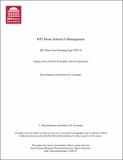| dc.contributor.author | Rubineau, Brian | |
| dc.contributor.author | Fernandez, Roberto M. | |
| dc.date.accessioned | 2011-11-04T15:54:40Z | |
| dc.date.available | 2011-11-04T15:54:40Z | |
| dc.date.issued | 2007-11 | |
| dc.identifier.uri | http://hdl.handle.net/1721.1/66931 | |
| dc.description.abstract | How does referral recruitment contribute to job segregation? Current theory emphasizes
the segregated nature of job-seekers’ information and contact networks. The job-seeker
perspective characterizing most research on network effects in the labor market leaves little role
for organizational influence. But referrals are necessarily initiated within a firm by referrers.
This paper focuses on the neglected half of the referring dyad and seeks to explain the
segregating effects of referring from the referrer’s perspective. Our main finding is that if a firm
can get its under-represented group to refer more, referral recruitment can be made neutral to job
segregation, or even integrative. Our analysis reveals a tipping point in referring dynamics –
precisely how much more the under-represented group needs to refer to neutralize the
segregating effects of referring. We build upon previous research to generate a formal model of
referring dynamics as a regular Markov population process. We use this model to build theory
regarding the segregating effects of referring, and the role of organizations in this process. In so
doing, we show the prevailing wisdom fails to explain how referring contributes to job
segregation. We reveal the conditions necessary for referring to segregate and identify policy
levers for firms to mitigate this effect. | en_US |
| dc.language.iso | en_US | en_US |
| dc.publisher | Cambridge, MA; Alfred P. Sloan School of Management, Massachusetts Institute of Technology | en_US |
| dc.relation.ispartofseries | MIT Sloan School of Management Working Paper;4783-10 | |
| dc.title | Tipping Points: Referral Homophily and Job Segregation | en_US |
| dc.type | Working Paper | en_US |
